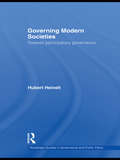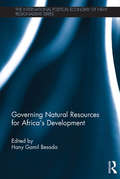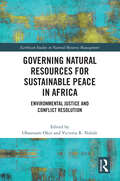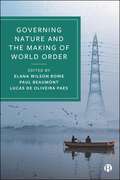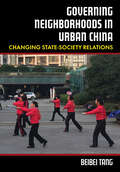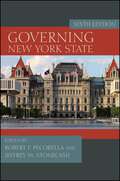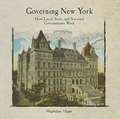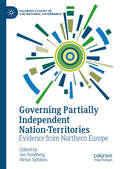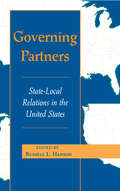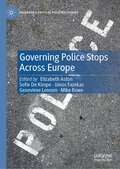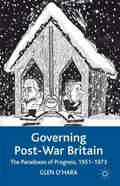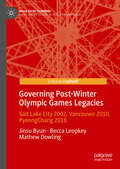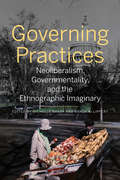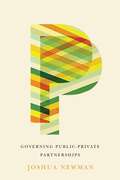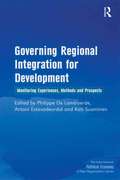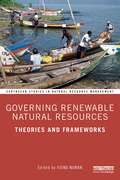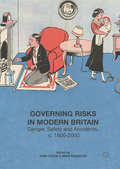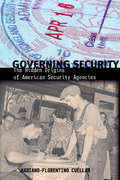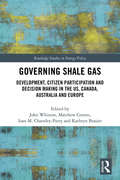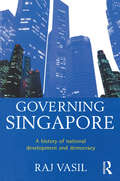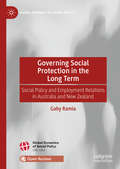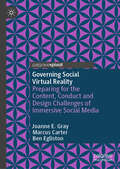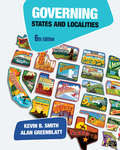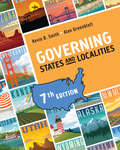- Table View
- List View
Governing Modern Societies: Towards Participatory Governance (Routledge Studies in Governance and Public Policy)
by Hubert HeineltIs the ‘golden age’ of democracy really over due to the pressures of globalisation and the erosion of the nation state? Within this book, Heinelt seeks to address the democratic deficit in political systems linked to limited Citizen Participation reflecting on the notion of democracy and participatory governance and how they relate to each other. Exploring democracy beyond the governmental structures and focusing on participatory governance in particular this book demonstrates that common notions of democracy have to be re-conceptualised without neglecting its key ideas. By arguing that it is a political task to turn the inevitability of governance into a participatory form, Heinelt develops a model of different ‘worlds of democratic actions’ which shows that democratic political systems have to be considered as a complex and broad web of various forms of interest articulation and intermediation as well as decision-making. Making an important contribution to the ‘third transformation of democracy’, this book will be of interest to students and scholars of governance, democracy, policymaking & European studies.
Governing Natural Resources for Africa’s Development (The International Political Economy of New Regionalisms Series)
by Hany Gamil BesadaBringing together some of the world’s leading thinkers and policy experts in the area of natural resource governance and management in Africa, this volume addresses the most critical policy issues affecting the continent’s ability to manage and govern its precious resources. The narrative of the book is solutions-driven, as experts weigh on specific issues within the context of Africa’s natural resource governance and offer appropriate policy recommendations on how to best manage the continent’s resources. This is a must-read for government policy makers in industrialized economies and, more importantly, in Africa and emerging economies, as well as for academic researchers working in the field, extractive companies operating on the continent, extractive industry and trade associations, and multilateral and donor aid institutions.
Governing Natural Resources for Sustainable Peace in Africa: Environmental Justice and Conflict Resolution (Earthscan Studies in Natural Resource Management)
by Victoria R. Nalule Obasesam OkoiThis book examines the dynamics of natural resource conflicts in Africa and explores the different governance approaches for securing sustainable peace. One of the most prominent challenges facing Africa today is the consequences of natural resource extraction. While these resources hold the potential for economic transformation across Africa, their extraction also comes with a range of environmental, social, and economic consequences, including issues related to governance. This book assembles a unique cohort of peacebuilding, environmental justice, and sustainable development scholars and practitioners from Africa and beyond to examine the dynamics of natural resource conflict and explore the governance approaches that offer pathways for sustainable peace in Africa. Drawing on case studies and empirical lessons from the Horn of Africa, Southern Africa, West Africa, East Africa, and the Central Sahel region, along with the African Union, the multidisciplinary contributors offer fresh insights into the nature of natural resource conflict in Africa, delve deeper into the complexities of natural resource governance, and highlight the interplay between resource governance and sustainable peace. By shedding light not only on Africa’s experiences and vulnerabilities but also on the challenges of natural resource governance, this book fills a crucial gap in understanding the connection between natural resource governance, conflict, and pathways for sustainable peace in Africa. Drawing on a range of disciplinary perspectives, this book will be of interest to students and scholars of natural resource governance, peace and conflict studies, environmental policy and justice, sustainable development, security studies and African studies more widely.
Governing Nature and the Making of World Order
by Elana Wilson Rowe, Paul Beaumont and Lucas de Oliveira PaesAvailable open access digitally under CC-BY-NC-ND licence. How have efforts to govern nature and address urgent global environmental challenges shaped, transformed or undermined processes of world ordering? Chapters in this book explore how efforts to govern nature have transformed – or are transforming – how we understand and practice world politics. Bringing together a team of contributors from around the world, the book traces this inquiry across diverse international policy fields, from security and peacebuilding through science cooperation and governing ecosystems to the politics of economic growth. Taken together, the book offers a conceptually ambitious and empirically grounded account of how the governance of nature and the making of world order intertwine and calls for a research agenda to attend to the growing impact of this interrelationship.
Governing Neighborhoods in Urban China: Changing State-Society Relations
by Beibei TangGoverning Neighborhoods in Urban China examines the key mechanisms operating at the grassroots level in China that contribute to urban development and increased public support for the legitimacy and authority of the Chinese state. Beibei Tang uncovers new trends and dynamics of urban neighborhood governance since the 2000s to reveal the significant factors that contribute to regime survival. Tang introduces the concept of hybrid authoritarianism, a governance mechanism an authoritarian state employs to produce governance legitimacy, public support, and regime sustainability. Hybrid authoritarianism is situated in an intermediary governance space between state and society. It accommodates both state and non-state actors, deals with a wide range of governance issues, employs flexible governance strategies, and in this context, ultimately strengthens CCP leadership. Tang documents processes of hybrid authoritarianism through her focus on various types of urban neighborhoods, including new urban middle-class neighborhoods, and the increasing urbanization of the countryside. Governing Neighborhoods in Urban China provides a conceptual framework that avoids scholarly approaches that tend to reify either one-party autocracy or Western-centric notions of democracy.
Governing New York State, Sixth Edition
by Jeffrey M. Stonecash Robert F. PecorellaNew York contains greater diversity than almost any other state. This diversity creates extensive social and political conflict within the state. Governing New York State, Sixth Edition provides expert assessment of how these conflicts are organized and represented, and how the political process and political institutions work in an effort to resolve them. Contributors explore the role of political parties and interest groups in representing these concerns. They also review the nature of the legislature, the governor, the courts, and public authorities as well as how these institutions play a role in making decisions. Finally, the impact of politics is analyzed for the policy areas of intergovernmental fiscal relations, welfare, health, and local education. The sixth edition of Governing New York State provides an excellent summary of the political process and most of the major policy controversies in the state.
Governing New York: How Local, State, And National Governments Work (Primary Sources Of New York City And New York State)
by Magdalena AlagnaGoverning New York How Local, State, and National Governments Work
Governing Partially Independent Nation-Territories: Evidence from Northern Europe (Palgrave Studies in Sub-National Governance)
by Stefan Sjöblom Jan SundbergThis book assesses the quality of self-government in four northern European regions with strong autonomy rights. Examining the experiences of Scotland, the Faroe Islands, Greenland and the Åland Islands, it considers how these regions have developed their own political and administrative systems within the larger states they form part of. The book looks to understand the key democratic and administrative qualities of a functioning self-government, and how geographic size and economic and human resources can impact the ways in which partially independent territories govern. It also assesses the emotional dimensions of regional nationalism, and how this impacts the concept and public perception of partially independent nation-territories. By focusing on the quality of self-government within these nation-territories, the book considers whether strong autonomy contributes to peaceful co-existence within established national borders, or provides new munition for secessionist movements. It will appeal to students and scholars of sub-national governance, European politics, territorial politics and conflict management.
Governing Partners: State-Local Relations in the United States (Transforming American Politics)
by Russell L HansonRecently, budgetary restraints and institutional gridlock have limited the role of the national government in domestic policymaking. Subnational governments have responded by assuming primary responsibility for a number of key problems, including economic development, educational improvement, environmental regulation, and health and welfare innovations. The United States has some 80,000 subnational governments from nation-sized states to mosquito abatement districts. A concise introduction to state-local relations, this volume of nine original essays includes an overview of the structure of state-local arrangements, central policy issues in state-local relations, and the likely future of state-local relations.
Governing Police Stops Across Europe (Palgrave's Critical Policing Studies)
by Elizabeth Aston Mike Rowe Genevieve Lennon Sofie De Kimpe János FazekasThis book takes a critical and comparative approach to the analysis of the governance of police stops across Europe. It draws on an EU COST Action research network on Police Stops which engaged academics and practitioners from 29 countries to better understand the practice of police stops. It begins by examining how police stops are defined and the various legal rules and levels of accountability afforded. The chapters are arranged by theme to focus on a core aspect of the governance of police stops. These include: legal frameworks and police discretion; internal governance; external accountability and civilian oversight; possibilities for legal recourse; and the different roles of data and technology. Each compares the distinct approaches evident across Europe, often employing case studies. The book adopts a critical approach, acknowledging governance as contested and involving diverse (state, non-state and supranational) actors. It considers implications for policing in a rapidly changing environment globally.
Governing Post-War Britain: The Paradoxes of Progress, 1951–1973
by Glen O’HaraGlen O'Hara draws a compelling picture of Second World War Britain by investigating relations between people and government: the electorate's rising expectations and demands for universally-available social services, the increasing complexity of the new solutions to these needs, and mounting frustration with both among both governors and governed.
Governing Post-Winter Olympic Games Legacies: Salt Lake City 2002, Vancouver 2010, PyeongChang 2018 (Mega Event Planning)
by Mathew Dowling Jinsu Byun Becca LeopkeyThis book provides a comprehensive analysis of post-Games legacy governance including stakeholder relationships, institutional conditions, and policy environments, while also empirically exploring the modes of governance employed by select cases of the Winter Olympic Games. This work offers insights to help practitioners develop and manage the governance of legacy more effectively. Theoretical and methodological implications, as well as future avenues of research are suggested.
Governing Practices: Neoliberalism, Governmentality, and the Ethnographic Imaginary
by Randy K. Lippert Michelle BradyNeoliberalism is among the most commonly used concepts in the social sciences. Furthermore, it is one of the most influential factors that have shaped the formation of public policy and politics. In Governing Practices, Michelle Brady and Randy Lippert bring together prominent scholars in sociology, criminology, anthropology, geography, and policy studies to extend and refine the current conversation about neoliberalism. The collection argues that a new methodological approach to analyzing contemporary policy and political change is needed. United by the common influence of Foucault's governmentality approach and an ethnographic imaginary, the collection presents original research on a diverse range of case studies including public-private partnerships, the governance of condos, community and state statistics, nanopolitics, philanthropy, education reform, and pay-day lending. These diverse studies add considerable depth to studies on governmentality and neoliberalism through a focus on governmental practices that have not previously been the focus of sustained analysis.
Governing Public-Private Partnerships
by Joshua NewmanA look at the dilemmas involved in using the private sector to deliver public infrastructure.
Governing Regional Integration for Development: Monitoring Experiences, Methods and Prospects (The International Political Economy of New Regionalisms Series)
by Antoni EstevadeordalDeveloping countries have joined the rapidly growing global system of regional trade agreements (RTAs) over the past years. The drive towards regional integration has advanced with the formation of new markets and groups in Latin America, Africa, Asia, the Middle East and Oceania with few developing countries remaining outside these regional schemes. This volume looks at how 'getting governance right' is a central element for successful RTA implementation, taking stock of the quality and effectiveness of the monitoring of development country RTAs around the world. Organized by the main world regions and primarily focusing on developing country RTAs, the book also includes two case studies focused on monitoring in developed country regional agreements by way of comparison. The contributors operationalize governance in the context of RTA implementation with a more narrow and technical term of 'monitoring' and provide eight important lessons for assessing monitoring around the world.
Governing Renewable Natural Resources: Theories and Frameworks (Earthscan Studies in Natural Resource Management)
by Fiona NunanIn one volume, this book brings together a diversity of approaches, theory and frameworks that can be used to analyse the governance of renewable natural resources. Renewable natural resources are under pressure, with over-exploitation and degradation raising concern globally. Understanding governance systems and practice is essential for developing effective and fair solutions. This book introduces readers to key concepts and issues concerned with the governance of renewable natural resources and illustrates the diversity of approaches, theories and frameworks that have been used to analyse governance systems and practice. Each chapter provides an introduction to an area of literature and theory and demonstrates application through a case study. The book covers a range of geographical locations, with a focus on low- and middle-income countries, and several types of natural resources. The approaches and theories introduced include common property theory, political ecology, institutional analysis, the social -ecological systems framework and social network analysis. Findings from across the chapters support an analytical focus on institutions and local context and a practical focus on diverse, flexible and inclusive governance solutions. The book serves as an essential introduction to the governance of renewable natural resources for students, researchers and practitioners.
Governing Risks in Modern Britain
by Tom Crook Mike EsbesterFormore than 200 years, everyday life in Britain has been beset by a variety ofdangers, from the mundane to the life-threatening. Governing Risks in Modern Britain focuses on the steps taken tomanage these dangers and to prevent accidents since approximately 1800. Itbrings together cutting-edge research to help us understand the multiple andcontested ways in which dangers have been governed. It demonstrates that thecategory of 'risk', broadly defined, provides a new means of historicising somekey developments in British society. Chapters explore road safety and policing,environmental and technological dangers, and occupational health and safety. Thebook thus brings together practices and ideas previously treated in isolation, situatingthem in a common context of risk-related debates, dilemmas and difficulties. Doingso, it argues, advances our understanding of how modern British society hasbeen governed and helps to set our risk-obsessed present in some much neededhistorical perspective.
Governing Security: The Hidden Origins of American Security Agencies
by Mariano-Florentino CuellarThe impact of public law depends on how politicians secure control of public organizations, and how these organizations in turn are used to define national security. Governing Securityexplores this dynamic by investigating the surprising history of two major federal agencies that touch the lives of Americans every day: the Roosevelt-era Federal Security Agency (which became today's Department of Health and Human Services) and the more recently created Department of Homeland Security. Through the stories of both organizations, Cuéllar offers a compelling account of crucial developments affecting the basic architecture of our nation. He shows how Americans end up choosing security goals not through an elaborate technical process, but in lively and overlapping settings involving conflict over agency autonomy, presidential power, and priorities for domestic and international risk regulation. Ultimately, as Cuéllar shows, the ongoing fights about the scope of national security reshape the very structure of government, particularly during#151;or in anticipation of#151;a national crisis.
Governing Shale Gas: Development, Citizen Participation and Decision Making in the US, Canada, Australia and Europe (Routledge Studies in Energy Policy)
by John Whitton Matthew Cotton Ioan M. Charnley-Parry Kathy BrasierShale energy development is an issue of global importance. The number of reserves globally, and their potential economic return, have increased dramatically in the past decade. Questions abound, however, about the appropriate governance systems to manage the risks of unconventional oil and gas development and the ability for citizens to engage and participate in decisions regarding these systems. Stakeholder participation is essential for the social and political legitimacy of energy extraction and production, what the industry calls a 'social license' to operate. This book attempts to bring together critical themes inherent in the energy governance literature and illustrate them through cases in multiple countries, including the US, the UK, Canada, South Africa, Germany and Poland. These themes include how multiple actors and institutions – industry, governments and regulatory bodies at all scales, communities, opposition movements, and individual landowners – have roles in developing, contesting, monitoring, and enforcing practices and regulations within unconventional oil and gas development. Overall, the book proposes a systemic, participatory, community-led approach required to achieve a form of legitimacy that allows communities to derive social priorities by a process of community visioning. This book will be of great relevance to scholars and policy-makers with an interest in shale gas development, and energy policy and governance.
Governing Singapore: Democracy and national development
by Raj VasilSingapore has its critics, but the city-state has achieved remarkable successes as a result of the voluntary trade-off of certain political rights for economic and social progress. In Governing Singapore, Raj Vasil supports this national bargain. He argues that in Asian new states like Singapore, economic and social under-development, as well as ethnic diversity and divisions make it impossible for Western liberal democracy to function effectively as an instrument of popular rule. The problems of under-development faced by Asian new states since decolonisation and independence continue to prove that democracy alone is not enough - national development and the need to adapt democracy to economic and social realities are equally important.Through reconciling democracy with national development, Singapore has transformed from a poor, backward Third World island into a prosperous and dynamic First World nation. Today Singapore is far better prepared for greater democratisation and increased popular participation.
Governing Social Protection in the Long Term: Social Policy and Employment Relations in Australia and New Zealand (Global Dynamics of Social Policy)
by Gaby RamiaThis open access book examines the comparative evolution of social protection in Australia and New Zealand from 1890 to the present day, focusing on the relationship between employment relations and social policy. Utilising longstanding and more recent developments in historical institutionalist methodology, Ramia investigates the relationship between these two policy domains in the context of social protection theory. He argues that treating employment relations as dynamic, and as inextricably intertwined with changes in the welfare state over time, allows for more accurate portrayal of similarity and difference in social protection. The book will be of most interest to researchers, advanced undergraduate and postgraduate students in social policy, employment relations, public policy, social and political history, and comparative politics.
Governing Social Virtual Reality: Preparing for the Content, Conduct and Design Challenges of Immersive Social Media
by Marcus Carter Joanne E. Gray Ben EglistonIn this ground-breaking book, we navigate the uncharted terrain of social virtual reality (VR), a technology that, while offering unprecedented immersive experiences, brings forth significant governance challenges. By merging theoretical insights with practical examples, the book examines the risks of harm in social VR environments, including both content and conduct issues. It charts a course for developing inclusive and safe social VR spaces that are respectful of diverse users’ rights and needs, laying out essential principles for policymakers, developers and regulators. The book is an urgent call to proactively shape the burgeoning field of VR for the betterment of all.
Governing States and Localities
by Kevin B. Smith Alan H. GreenblattThe partisan and ideological polarization associated with federal government plagues states and localities too, bringing with it significant implications for public policy and intergovernmental relations. The trusted and proven Governing States and Localities guides students through these issues and continues its focus on the role economic and budget pressures play. With their engaging journalistic writing and crisp storytelling, Kevin B. Smith and Alan Greenblatt employ a comparative approach to explain how and why states and localities are both similar and different in institutional structure, culture, history, economy, geography, and demographics. A great blend of high-quality academic analysis and the latest scholarship, the Sixth Edition is thoroughly updated to account for such major developments as state vs. federal conflicts over immigration reform, gun control, and voter rights; health and education reforms aimed at improving the effectiveness of state and local government service delivery; and the lingering effects of the Great Recession.
Governing States and Localities
by Kevin B. Smith Alan H. GreenblattThe partisan and ideological polarization associated with federal government plagues states and localities too, bringing with it significant implications for public policy and intergovernmental relations. The trusted and proven Governing States and Localities guides students through these issues and continues its focus on the role economic and budget pressures play. With their engaging journalistic writing and crisp storytelling, Kevin B. Smith and Alan Greenblatt employ a comparative approach to explain how and why states and localities are both similar and different in institutional structure, culture, history, economy, geography, and demographics. A great blend of high-quality academic analysis and the latest scholarship, the Sixth Edition is thoroughly updated to account for such major developments as state vs. federal conflicts over immigration reform, gun control, and voter rights; health and education reforms aimed at improving the effectiveness of state and local government service delivery; and the lingering effects of the Great Recession.
Governing States and Localities
by Kevin B. Smith Alan H. GreenblattThe trusted and proven Governing States and Localities guides you through the contentious environment of state and local politics and focuses on the role that economic and budget pressures play on issues facing state and local governments. With their engaging journalistic writing and crisp storytelling, Kevin B. Smith and Alan Greenblatt employ a comparative approach to explain how and why states and localities are both similar and different. The Seventh Edition is thoroughly updated to account for such major developments as state vs. federal conflicts over immigration reform, school shootings, and gun control; the impact of the Donald Trump presidency on intergovernmental relations and issues of central interest to states and localities; and the lingering effects of the Great Recession.
